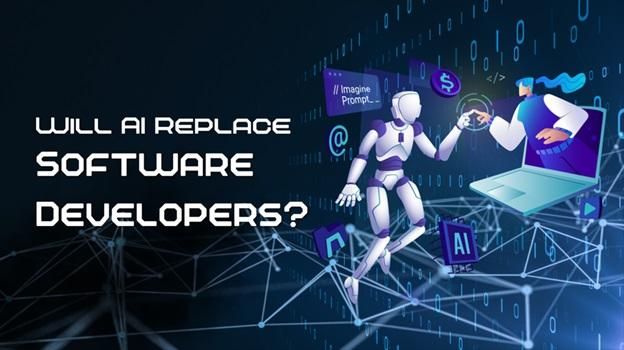

The rapid advancement of artificial intelligence has sparked debates about its potential to replace human workers across various industries. (Let’s explore this topic in more detail with 2048 Game below) As AI continues to evolve, many wonder if it could eventually take over the role of software developers, a profession that has long been considered safe from automation.
Artificial intelligence has made significant strides in recent years, transforming numerous industries and revolutionizing the way we work. In the realm of software development, AI-powered tools and technologies have already begun to impact various aspects of the development process. From code generation to bug detection and automated testing, AI is proving to be a valuable asset for developers.
One of the most prominent applications of AI in software development is code generation. Machine learning algorithms can analyze vast amounts of existing code and learn patterns to generate new code snippets or even entire functions. This capability has the potential to streamline the development process and reduce the time spent on repetitive coding tasks.
Additionally, AI-powered tools are becoming increasingly adept at identifying and fixing bugs in code. These tools can analyze code for potential issues, suggest improvements, and even automatically apply fixes in some cases. This not only saves developers time but also helps improve the overall quality and reliability of software products.
Read more: The Role of AI in Healthcare Breakthroughs
While AI has shown promise in certain aspects of software development, it still faces significant limitations that prevent it from fully replacing human developers. One of the primary challenges is the inability of AI to truly understand complex business requirements and translate them into functional software solutions.
Software development often involves interpreting ambiguous client needs, making judgment calls, and adapting to changing project requirements. These tasks require a level of creativity, critical thinking, and problem-solving skills that current AI systems struggle to replicate. Human developers possess the ability to think abstractly, consider multiple perspectives, and devise innovative solutions to unique challenges.
Furthermore, AI lacks the emotional intelligence and interpersonal skills necessary for effective collaboration within development teams and with clients. Software development is often a collaborative effort that requires clear communication, empathy, and the ability to navigate team dynamics. These soft skills are essential for successful project management and client relationships, areas where human developers excel.
As AI technology continues to advance, it is likely to play an increasingly significant role in software development. However, rather than replacing human developers entirely, AI is more likely to augment their capabilities and enhance their productivity.
The future of software development may involve a symbiotic relationship between human developers and AI-powered tools. Developers can leverage AI to handle repetitive tasks, generate code snippets, and identify potential issues, allowing them to focus on higher-level problem-solving and creative aspects of software design.
AI may also enable the democratization of software development, making it more accessible to individuals without formal programming backgrounds. Low-code and no-code platforms powered by AI could allow non-developers to create simple applications and automate processes, expanding the pool of people who can contribute to software development.
As AI becomes more prevalent in software development, the role of human developers is likely to evolve. Rather than being replaced, developers may need to adapt their skills and focus on areas where they can add the most value.
Future software developers may need to develop expertise in AI and machine learning to effectively leverage these technologies in their work. They may also need to cultivate skills in areas such as system architecture, algorithm design, and data analysis to complement the capabilities of AI tools.
Additionally, the importance of soft skills such as communication, creativity, and critical thinking may become even more pronounced as developers take on more strategic roles in software development projects. The ability to understand complex business requirements, translate them into technical specifications, and collaborate effectively with diverse teams will remain crucial.
The integration of AI into software development also raises important ethical considerations and challenges that need to be addressed. As AI systems become more advanced and autonomous, questions arise about accountability, transparency, and potential biases in AI-generated code.
Ensuring the ethical use of AI in software development will require careful consideration of issues such as data privacy, algorithmic fairness, and the potential impact on employment in the industry. Developers and organizations will need to establish guidelines and best practices for responsible AI implementation in software development processes.
While AI has the potential to revolutionize software development, there are certain aspects of the process that are likely to remain uniquely human. The ability to empathize with users, understand complex business contexts, and devise creative solutions to novel problems are areas where human developers continue to excel.
Software development often involves navigating ambiguity, making judgment calls, and adapting to changing requirements. These tasks require a level of flexibility and intuition that current AI systems struggle to replicate. Human developers bring a wealth of experience, domain knowledge, and critical thinking skills that allow them to tackle complex challenges and innovate in ways that AI cannot.
Moreover, the human touch is crucial in ensuring that software solutions align with ethical considerations, cultural nuances, and user expectations. Developers play a vital role in creating user-centric designs, considering accessibility needs, and ensuring that software products are inclusive and respectful of diverse user groups.
Rather than viewing AI as a replacement for software developers, it is more productive to consider how humans and AI can work together to achieve better outcomes. The future of software development is likely to involve a collaborative approach where developers leverage AI tools to enhance their capabilities and streamline their workflows.
Human developers can focus on high-level decision-making, creative problem-solving, and strategic planning, while AI handles routine tasks, generates code snippets, and provides valuable insights through data analysis. This symbiotic relationship can lead to increased productivity, improved code quality, and more innovative software solutions.
Furthermore, human oversight remains crucial in ensuring the reliability, security, and ethical implementation of AI-generated code. Developers play a vital role in validating AI outputs, identifying potential biases or errors, and making necessary adjustments to ensure the integrity of software products.
As AI continues to evolve and reshape the software development landscape, it is essential for developers to embrace continuous learning and adaptation. Staying current with emerging technologies, AI advancements, and industry trends will be crucial for developers to remain competitive and valuable in the field.
Developers may need to expand their skill sets to include AI and machine learning expertise, as well as develop proficiency in working with AI-powered tools and platforms. Additionally, cultivating skills in areas such as data science, cloud computing, and cybersecurity can help developers position themselves for success in an AI-driven future.
The ability to adapt to new programming languages, frameworks, and development methodologies will remain important as the technology landscape continues to evolve. Developers who can quickly learn and apply new skills will be better equipped to leverage AI tools effectively and contribute to innovative software solutions.
As the role of AI in software development expands, educational institutions and training programs will need to adapt their curricula to prepare future developers for this evolving landscape. This may involve incorporating AI and machine learning courses into computer science programs, as well as emphasizing the development of critical thinking, problem-solving, and creativity skills.
Education programs may also need to focus on teaching students how to effectively collaborate with AI systems, interpret AI-generated outputs, and make informed decisions based on AI-driven insights. Additionally, fostering an understanding of ethical considerations and responsible AI implementation will be crucial for future developers.
While AI is unlikely to completely replace software developers in the near future, it may lead to shifts in the job market and career trajectories within the field. Some routine coding tasks may become automated, potentially reducing the demand for entry-level positions that focus primarily on these tasks.
However, new opportunities are likely to emerge as AI becomes more integrated into software development processes. Roles such as AI specialists, machine learning engineers, and AI ethics consultants may become increasingly important. Additionally, developers who can effectively leverage AI tools and possess a combination of technical and soft skills will be well-positioned for leadership roles in software development projects.
The impact of AI on software development is likely to vary across different regions and countries. Factors such as technological infrastructure, regulatory environments, and cultural attitudes towards AI adoption will influence how quickly and extensively AI is integrated into software development practices.
In some regions, AI may be embraced more rapidly, leading to faster transformation of the software development industry. In others, concerns about job displacement or ethical implications may result in a more cautious approach to AI adoption. This global variation may create opportunities for developers with expertise in AI-driven software development to work on international projects or contribute to cross-cultural collaborations.
Read more: Top AI Career Paths and How to Get Started
While AI has the potential to significantly impact the field of software development, it is unlikely to completely replace human developers in the foreseeable future. Instead, AI is more likely to augment and enhance the capabilities of human developers, leading to a collaborative approach that combines the strengths of both AI and human intelligence.
The future of software development will likely involve a symbiotic relationship between developers and AI-powered tools, with humans focusing on high-level problem-solving, creativity, and strategic decision-making while leveraging AI for routine tasks and data-driven insights.